University Nursing Assignment: Analyzing the Case of Martin Chen
VerifiedAdded on 2023/01/20
|17
|4898
|70
Essay
AI Summary
This essay presents a comprehensive nursing case study of Martin Chen, a 78-year-old man with a history of chronic diseases including diabetes, cardiovascular issues, and potential dementia. The essay begins by outlining Martin's complex care needs, emphasizing the importance of consumer-directed care in Australia. It then identifies three key priorities: medication management, nutritional support, and social/psychological care. The essay further explores the role of a multidisciplinary team, including a pharmacist (his daughter), a dietician, an occupational therapist, and a physiotherapist, in reducing hospital readmissions and improving Martin's quality of life at home. It discusses potential barriers to implementing care, resources for restorative care, and the role of a registered nurse. The analysis highlights the importance of effective medication management, person-centered nutrition plans, and social engagement, including spiritual practices, to promote overall health and well-being. The case study underscores the need for tailored interventions to address the specific needs of older adults with chronic conditions, emphasizing the benefits of home-based care in enhancing health outcomes and reducing the burden on healthcare systems.
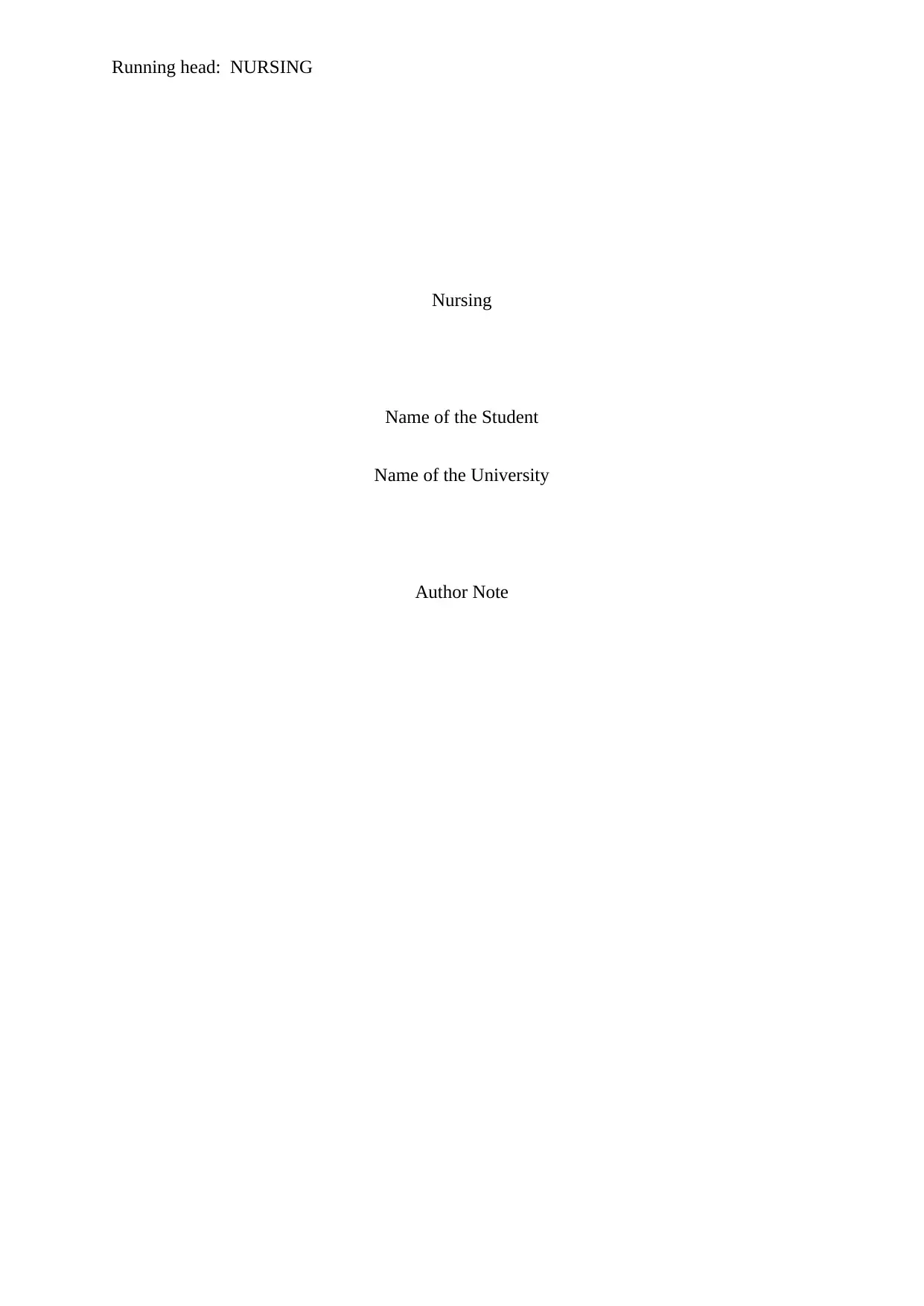
Running head: NURSING
Nursing
Name of the Student
Name of the University
Author Note
Nursing
Name of the Student
Name of the University
Author Note
Paraphrase This Document
Need a fresh take? Get an instant paraphrase of this document with our AI Paraphraser
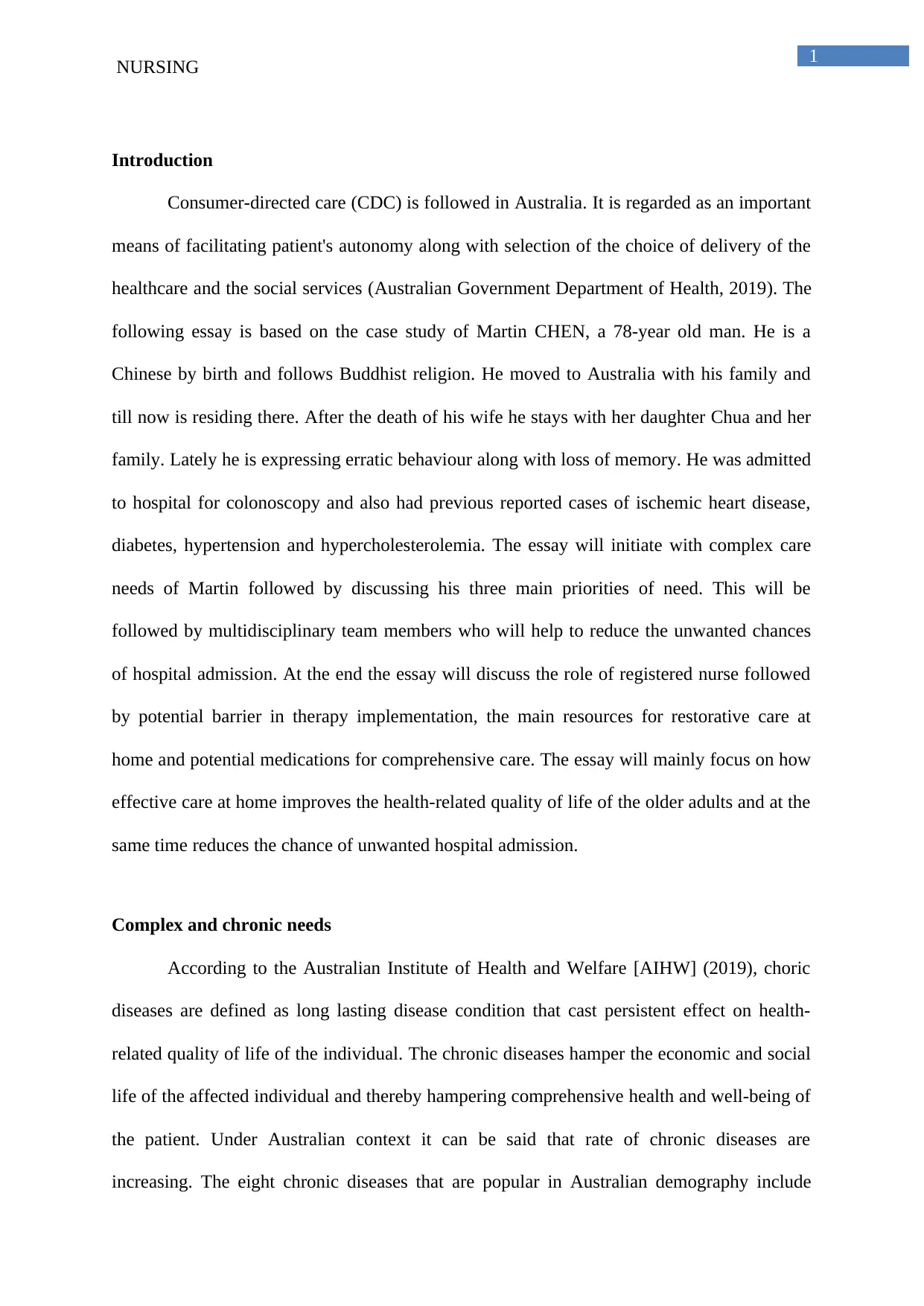
1
NURSING
Introduction
Consumer-directed care (CDC) is followed in Australia. It is regarded as an important
means of facilitating patient's autonomy along with selection of the choice of delivery of the
healthcare and the social services (Australian Government Department of Health, 2019). The
following essay is based on the case study of Martin CHEN, a 78-year old man. He is a
Chinese by birth and follows Buddhist religion. He moved to Australia with his family and
till now is residing there. After the death of his wife he stays with her daughter Chua and her
family. Lately he is expressing erratic behaviour along with loss of memory. He was admitted
to hospital for colonoscopy and also had previous reported cases of ischemic heart disease,
diabetes, hypertension and hypercholesterolemia. The essay will initiate with complex care
needs of Martin followed by discussing his three main priorities of need. This will be
followed by multidisciplinary team members who will help to reduce the unwanted chances
of hospital admission. At the end the essay will discuss the role of registered nurse followed
by potential barrier in therapy implementation, the main resources for restorative care at
home and potential medications for comprehensive care. The essay will mainly focus on how
effective care at home improves the health-related quality of life of the older adults and at the
same time reduces the chance of unwanted hospital admission.
Complex and chronic needs
According to the Australian Institute of Health and Welfare [AIHW] (2019), choric
diseases are defined as long lasting disease condition that cast persistent effect on health-
related quality of life of the individual. The chronic diseases hamper the economic and social
life of the affected individual and thereby hampering comprehensive health and well-being of
the patient. Under Australian context it can be said that rate of chronic diseases are
increasing. The eight chronic diseases that are popular in Australian demography include
NURSING
Introduction
Consumer-directed care (CDC) is followed in Australia. It is regarded as an important
means of facilitating patient's autonomy along with selection of the choice of delivery of the
healthcare and the social services (Australian Government Department of Health, 2019). The
following essay is based on the case study of Martin CHEN, a 78-year old man. He is a
Chinese by birth and follows Buddhist religion. He moved to Australia with his family and
till now is residing there. After the death of his wife he stays with her daughter Chua and her
family. Lately he is expressing erratic behaviour along with loss of memory. He was admitted
to hospital for colonoscopy and also had previous reported cases of ischemic heart disease,
diabetes, hypertension and hypercholesterolemia. The essay will initiate with complex care
needs of Martin followed by discussing his three main priorities of need. This will be
followed by multidisciplinary team members who will help to reduce the unwanted chances
of hospital admission. At the end the essay will discuss the role of registered nurse followed
by potential barrier in therapy implementation, the main resources for restorative care at
home and potential medications for comprehensive care. The essay will mainly focus on how
effective care at home improves the health-related quality of life of the older adults and at the
same time reduces the chance of unwanted hospital admission.
Complex and chronic needs
According to the Australian Institute of Health and Welfare [AIHW] (2019), choric
diseases are defined as long lasting disease condition that cast persistent effect on health-
related quality of life of the individual. The chronic diseases hamper the economic and social
life of the affected individual and thereby hampering comprehensive health and well-being of
the patient. Under Australian context it can be said that rate of chronic diseases are
increasing. The eight chronic diseases that are popular in Australian demography include
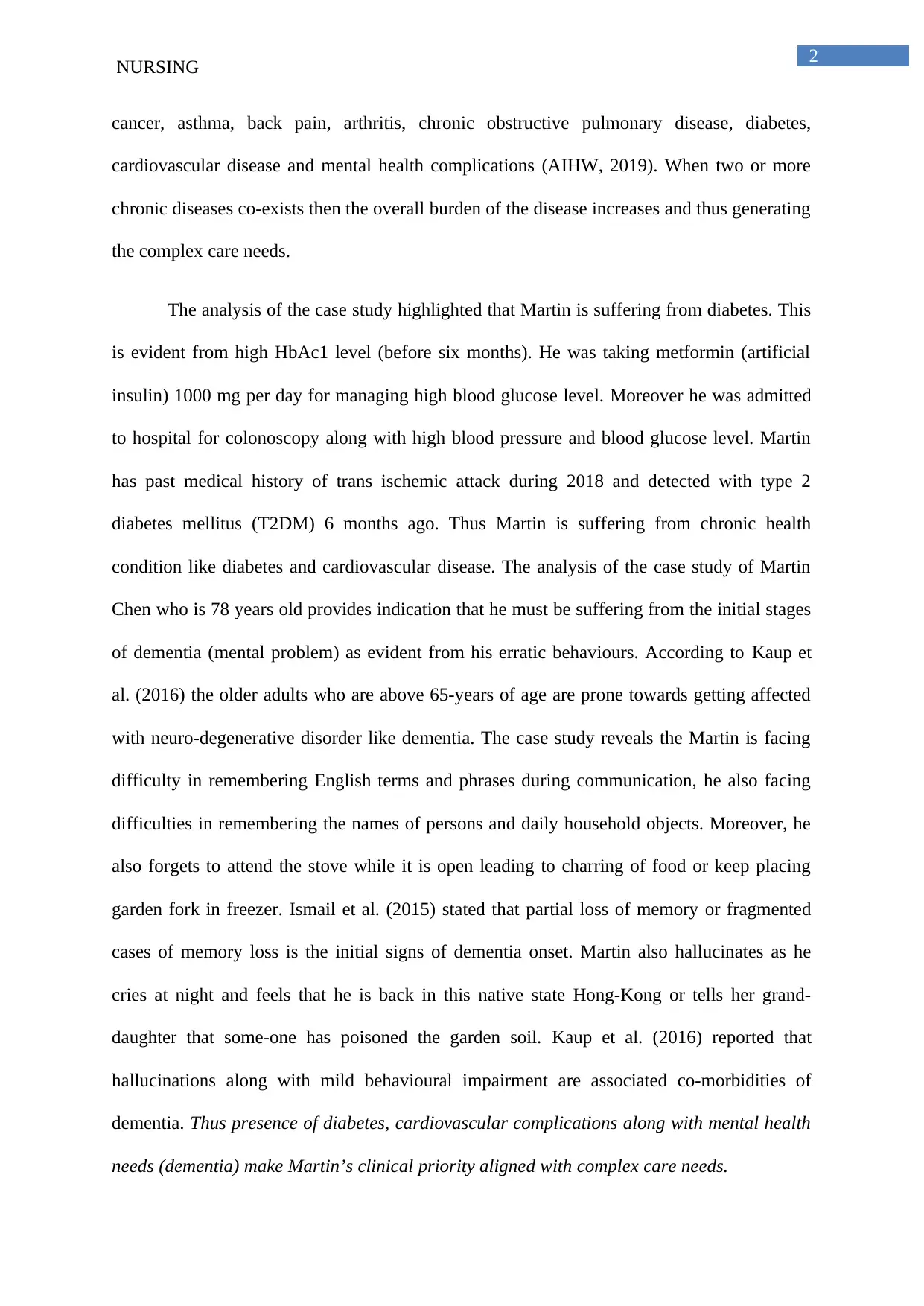
2
NURSING
cancer, asthma, back pain, arthritis, chronic obstructive pulmonary disease, diabetes,
cardiovascular disease and mental health complications (AIHW, 2019). When two or more
chronic diseases co-exists then the overall burden of the disease increases and thus generating
the complex care needs.
The analysis of the case study highlighted that Martin is suffering from diabetes. This
is evident from high HbAc1 level (before six months). He was taking metformin (artificial
insulin) 1000 mg per day for managing high blood glucose level. Moreover he was admitted
to hospital for colonoscopy along with high blood pressure and blood glucose level. Martin
has past medical history of trans ischemic attack during 2018 and detected with type 2
diabetes mellitus (T2DM) 6 months ago. Thus Martin is suffering from chronic health
condition like diabetes and cardiovascular disease. The analysis of the case study of Martin
Chen who is 78 years old provides indication that he must be suffering from the initial stages
of dementia (mental problem) as evident from his erratic behaviours. According to Kaup et
al. (2016) the older adults who are above 65-years of age are prone towards getting affected
with neuro-degenerative disorder like dementia. The case study reveals the Martin is facing
difficulty in remembering English terms and phrases during communication, he also facing
difficulties in remembering the names of persons and daily household objects. Moreover, he
also forgets to attend the stove while it is open leading to charring of food or keep placing
garden fork in freezer. Ismail et al. (2015) stated that partial loss of memory or fragmented
cases of memory loss is the initial signs of dementia onset. Martin also hallucinates as he
cries at night and feels that he is back in this native state Hong-Kong or tells her grand-
daughter that some-one has poisoned the garden soil. Kaup et al. (2016) reported that
hallucinations along with mild behavioural impairment are associated co-morbidities of
dementia. Thus presence of diabetes, cardiovascular complications along with mental health
needs (dementia) make Martin’s clinical priority aligned with complex care needs.
NURSING
cancer, asthma, back pain, arthritis, chronic obstructive pulmonary disease, diabetes,
cardiovascular disease and mental health complications (AIHW, 2019). When two or more
chronic diseases co-exists then the overall burden of the disease increases and thus generating
the complex care needs.
The analysis of the case study highlighted that Martin is suffering from diabetes. This
is evident from high HbAc1 level (before six months). He was taking metformin (artificial
insulin) 1000 mg per day for managing high blood glucose level. Moreover he was admitted
to hospital for colonoscopy along with high blood pressure and blood glucose level. Martin
has past medical history of trans ischemic attack during 2018 and detected with type 2
diabetes mellitus (T2DM) 6 months ago. Thus Martin is suffering from chronic health
condition like diabetes and cardiovascular disease. The analysis of the case study of Martin
Chen who is 78 years old provides indication that he must be suffering from the initial stages
of dementia (mental problem) as evident from his erratic behaviours. According to Kaup et
al. (2016) the older adults who are above 65-years of age are prone towards getting affected
with neuro-degenerative disorder like dementia. The case study reveals the Martin is facing
difficulty in remembering English terms and phrases during communication, he also facing
difficulties in remembering the names of persons and daily household objects. Moreover, he
also forgets to attend the stove while it is open leading to charring of food or keep placing
garden fork in freezer. Ismail et al. (2015) stated that partial loss of memory or fragmented
cases of memory loss is the initial signs of dementia onset. Martin also hallucinates as he
cries at night and feels that he is back in this native state Hong-Kong or tells her grand-
daughter that some-one has poisoned the garden soil. Kaup et al. (2016) reported that
hallucinations along with mild behavioural impairment are associated co-morbidities of
dementia. Thus presence of diabetes, cardiovascular complications along with mental health
needs (dementia) make Martin’s clinical priority aligned with complex care needs.
⊘ This is a preview!⊘
Do you want full access?
Subscribe today to unlock all pages.

Trusted by 1+ million students worldwide
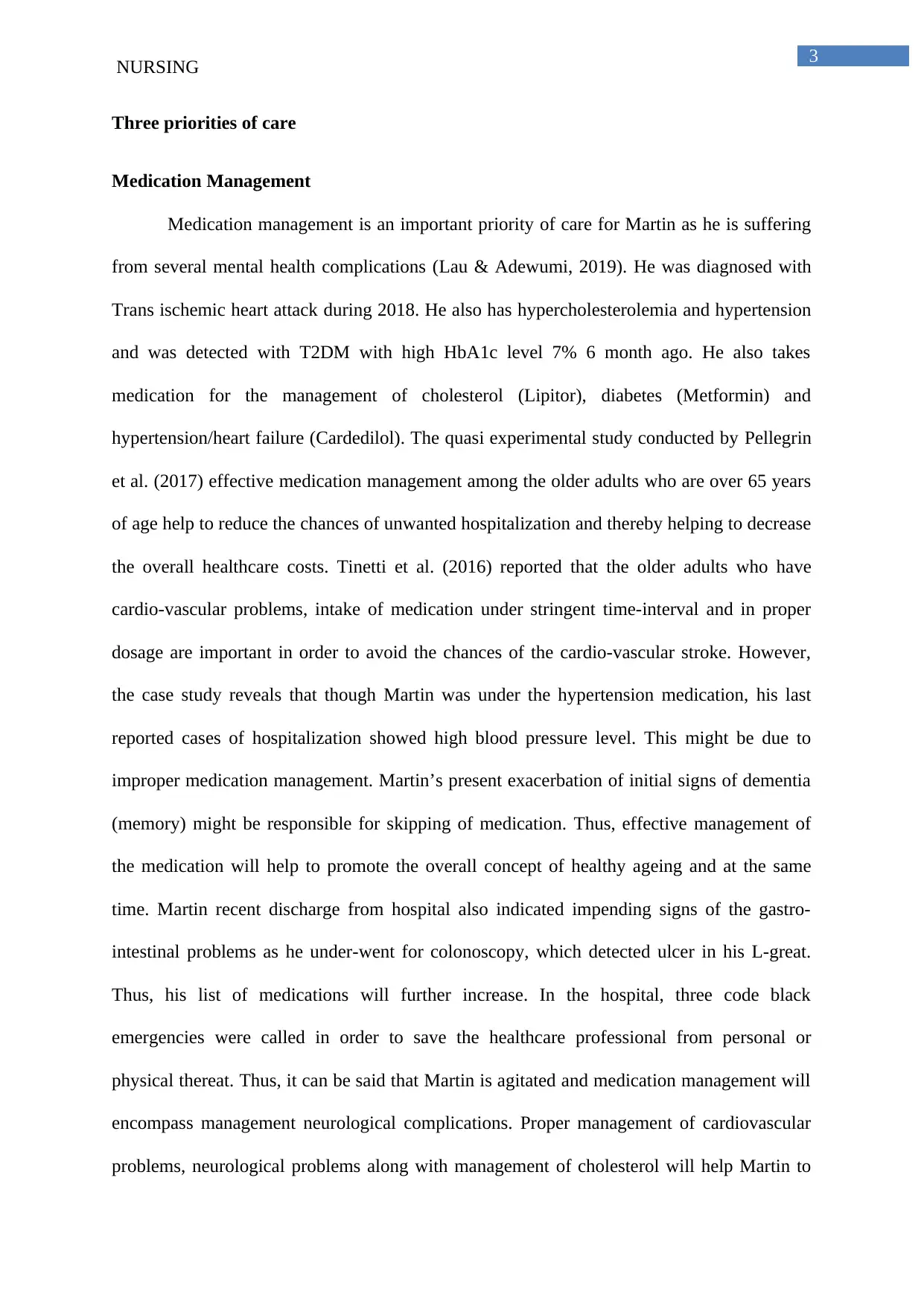
3
NURSING
Three priorities of care
Medication Management
Medication management is an important priority of care for Martin as he is suffering
from several mental health complications (Lau & Adewumi, 2019). He was diagnosed with
Trans ischemic heart attack during 2018. He also has hypercholesterolemia and hypertension
and was detected with T2DM with high HbA1c level 7% 6 month ago. He also takes
medication for the management of cholesterol (Lipitor), diabetes (Metformin) and
hypertension/heart failure (Cardedilol). The quasi experimental study conducted by Pellegrin
et al. (2017) effective medication management among the older adults who are over 65 years
of age help to reduce the chances of unwanted hospitalization and thereby helping to decrease
the overall healthcare costs. Tinetti et al. (2016) reported that the older adults who have
cardio-vascular problems, intake of medication under stringent time-interval and in proper
dosage are important in order to avoid the chances of the cardio-vascular stroke. However,
the case study reveals that though Martin was under the hypertension medication, his last
reported cases of hospitalization showed high blood pressure level. This might be due to
improper medication management. Martin’s present exacerbation of initial signs of dementia
(memory) might be responsible for skipping of medication. Thus, effective management of
the medication will help to promote the overall concept of healthy ageing and at the same
time. Martin recent discharge from hospital also indicated impending signs of the gastro-
intestinal problems as he under-went for colonoscopy, which detected ulcer in his L-great.
Thus, his list of medications will further increase. In the hospital, three code black
emergencies were called in order to save the healthcare professional from personal or
physical thereat. Thus, it can be said that Martin is agitated and medication management will
encompass management neurological complications. Proper management of cardiovascular
problems, neurological problems along with management of cholesterol will help Martin to
NURSING
Three priorities of care
Medication Management
Medication management is an important priority of care for Martin as he is suffering
from several mental health complications (Lau & Adewumi, 2019). He was diagnosed with
Trans ischemic heart attack during 2018. He also has hypercholesterolemia and hypertension
and was detected with T2DM with high HbA1c level 7% 6 month ago. He also takes
medication for the management of cholesterol (Lipitor), diabetes (Metformin) and
hypertension/heart failure (Cardedilol). The quasi experimental study conducted by Pellegrin
et al. (2017) effective medication management among the older adults who are over 65 years
of age help to reduce the chances of unwanted hospitalization and thereby helping to decrease
the overall healthcare costs. Tinetti et al. (2016) reported that the older adults who have
cardio-vascular problems, intake of medication under stringent time-interval and in proper
dosage are important in order to avoid the chances of the cardio-vascular stroke. However,
the case study reveals that though Martin was under the hypertension medication, his last
reported cases of hospitalization showed high blood pressure level. This might be due to
improper medication management. Martin’s present exacerbation of initial signs of dementia
(memory) might be responsible for skipping of medication. Thus, effective management of
the medication will help to promote the overall concept of healthy ageing and at the same
time. Martin recent discharge from hospital also indicated impending signs of the gastro-
intestinal problems as he under-went for colonoscopy, which detected ulcer in his L-great.
Thus, his list of medications will further increase. In the hospital, three code black
emergencies were called in order to save the healthcare professional from personal or
physical thereat. Thus, it can be said that Martin is agitated and medication management will
encompass management neurological complications. Proper management of cardiovascular
problems, neurological problems along with management of cholesterol will help Martin to
Paraphrase This Document
Need a fresh take? Get an instant paraphrase of this document with our AI Paraphraser
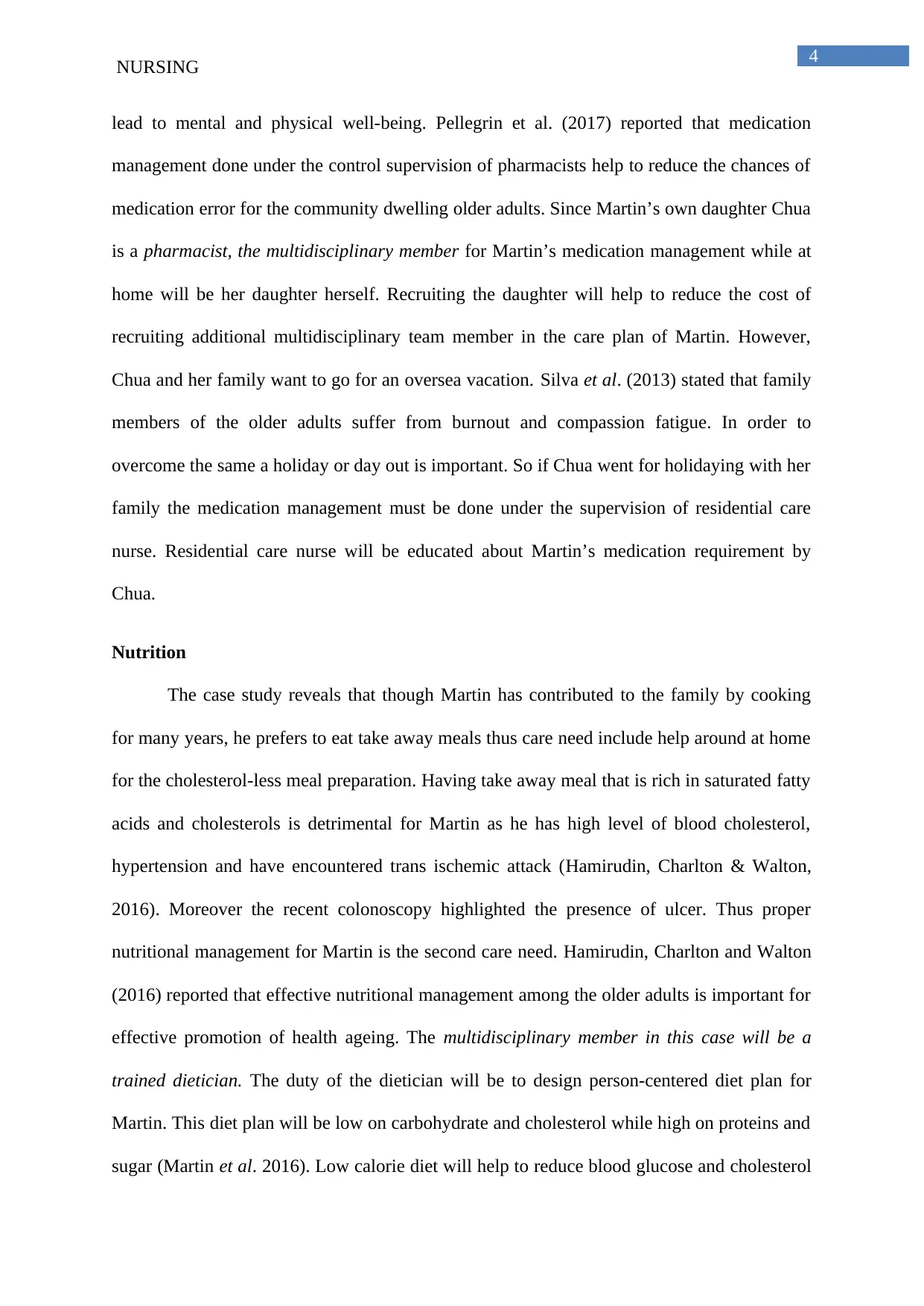
4
NURSING
lead to mental and physical well-being. Pellegrin et al. (2017) reported that medication
management done under the control supervision of pharmacists help to reduce the chances of
medication error for the community dwelling older adults. Since Martin’s own daughter Chua
is a pharmacist, the multidisciplinary member for Martin’s medication management while at
home will be her daughter herself. Recruiting the daughter will help to reduce the cost of
recruiting additional multidisciplinary team member in the care plan of Martin. However,
Chua and her family want to go for an oversea vacation. Silva et al. (2013) stated that family
members of the older adults suffer from burnout and compassion fatigue. In order to
overcome the same a holiday or day out is important. So if Chua went for holidaying with her
family the medication management must be done under the supervision of residential care
nurse. Residential care nurse will be educated about Martin’s medication requirement by
Chua.
Nutrition
The case study reveals that though Martin has contributed to the family by cooking
for many years, he prefers to eat take away meals thus care need include help around at home
for the cholesterol-less meal preparation. Having take away meal that is rich in saturated fatty
acids and cholesterols is detrimental for Martin as he has high level of blood cholesterol,
hypertension and have encountered trans ischemic attack (Hamirudin, Charlton & Walton,
2016). Moreover the recent colonoscopy highlighted the presence of ulcer. Thus proper
nutritional management for Martin is the second care need. Hamirudin, Charlton and Walton
(2016) reported that effective nutritional management among the older adults is important for
effective promotion of health ageing. The multidisciplinary member in this case will be a
trained dietician. The duty of the dietician will be to design person-centered diet plan for
Martin. This diet plan will be low on carbohydrate and cholesterol while high on proteins and
sugar (Martin et al. 2016). Low calorie diet will help to reduce blood glucose and cholesterol
NURSING
lead to mental and physical well-being. Pellegrin et al. (2017) reported that medication
management done under the control supervision of pharmacists help to reduce the chances of
medication error for the community dwelling older adults. Since Martin’s own daughter Chua
is a pharmacist, the multidisciplinary member for Martin’s medication management while at
home will be her daughter herself. Recruiting the daughter will help to reduce the cost of
recruiting additional multidisciplinary team member in the care plan of Martin. However,
Chua and her family want to go for an oversea vacation. Silva et al. (2013) stated that family
members of the older adults suffer from burnout and compassion fatigue. In order to
overcome the same a holiday or day out is important. So if Chua went for holidaying with her
family the medication management must be done under the supervision of residential care
nurse. Residential care nurse will be educated about Martin’s medication requirement by
Chua.
Nutrition
The case study reveals that though Martin has contributed to the family by cooking
for many years, he prefers to eat take away meals thus care need include help around at home
for the cholesterol-less meal preparation. Having take away meal that is rich in saturated fatty
acids and cholesterols is detrimental for Martin as he has high level of blood cholesterol,
hypertension and have encountered trans ischemic attack (Hamirudin, Charlton & Walton,
2016). Moreover the recent colonoscopy highlighted the presence of ulcer. Thus proper
nutritional management for Martin is the second care need. Hamirudin, Charlton and Walton
(2016) reported that effective nutritional management among the older adults is important for
effective promotion of health ageing. The multidisciplinary member in this case will be a
trained dietician. The duty of the dietician will be to design person-centered diet plan for
Martin. This diet plan will be low on carbohydrate and cholesterol while high on proteins and
sugar (Martin et al. 2016). Low calorie diet will help to reduce blood glucose and cholesterol
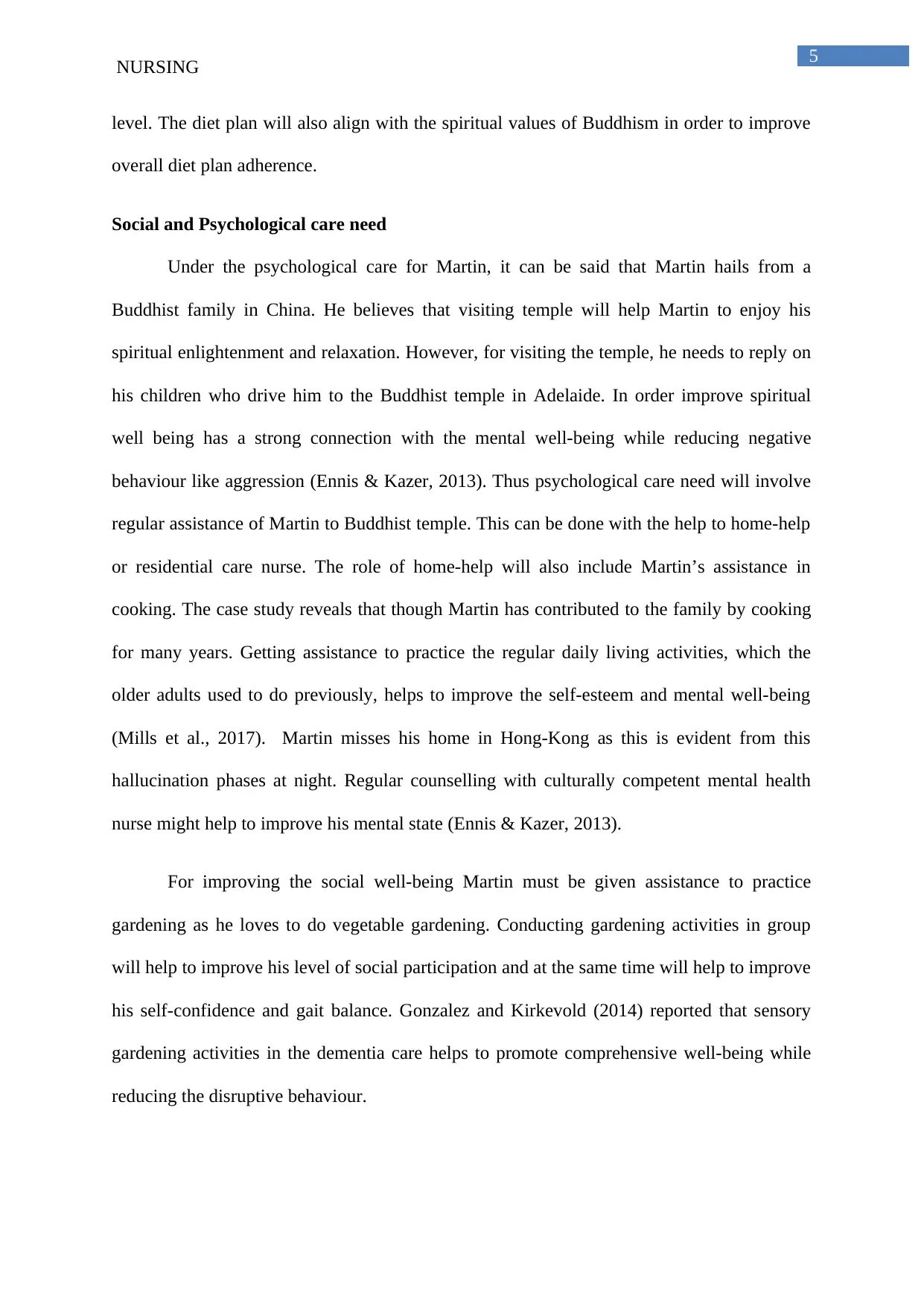
5
NURSING
level. The diet plan will also align with the spiritual values of Buddhism in order to improve
overall diet plan adherence.
Social and Psychological care need
Under the psychological care for Martin, it can be said that Martin hails from a
Buddhist family in China. He believes that visiting temple will help Martin to enjoy his
spiritual enlightenment and relaxation. However, for visiting the temple, he needs to reply on
his children who drive him to the Buddhist temple in Adelaide. In order improve spiritual
well being has a strong connection with the mental well-being while reducing negative
behaviour like aggression (Ennis & Kazer, 2013). Thus psychological care need will involve
regular assistance of Martin to Buddhist temple. This can be done with the help to home-help
or residential care nurse. The role of home-help will also include Martin’s assistance in
cooking. The case study reveals that though Martin has contributed to the family by cooking
for many years. Getting assistance to practice the regular daily living activities, which the
older adults used to do previously, helps to improve the self-esteem and mental well-being
(Mills et al., 2017). Martin misses his home in Hong-Kong as this is evident from this
hallucination phases at night. Regular counselling with culturally competent mental health
nurse might help to improve his mental state (Ennis & Kazer, 2013).
For improving the social well-being Martin must be given assistance to practice
gardening as he loves to do vegetable gardening. Conducting gardening activities in group
will help to improve his level of social participation and at the same time will help to improve
his self-confidence and gait balance. Gonzalez and Kirkevold (2014) reported that sensory
gardening activities in the dementia care helps to promote comprehensive well-being while
reducing the disruptive behaviour.
NURSING
level. The diet plan will also align with the spiritual values of Buddhism in order to improve
overall diet plan adherence.
Social and Psychological care need
Under the psychological care for Martin, it can be said that Martin hails from a
Buddhist family in China. He believes that visiting temple will help Martin to enjoy his
spiritual enlightenment and relaxation. However, for visiting the temple, he needs to reply on
his children who drive him to the Buddhist temple in Adelaide. In order improve spiritual
well being has a strong connection with the mental well-being while reducing negative
behaviour like aggression (Ennis & Kazer, 2013). Thus psychological care need will involve
regular assistance of Martin to Buddhist temple. This can be done with the help to home-help
or residential care nurse. The role of home-help will also include Martin’s assistance in
cooking. The case study reveals that though Martin has contributed to the family by cooking
for many years. Getting assistance to practice the regular daily living activities, which the
older adults used to do previously, helps to improve the self-esteem and mental well-being
(Mills et al., 2017). Martin misses his home in Hong-Kong as this is evident from this
hallucination phases at night. Regular counselling with culturally competent mental health
nurse might help to improve his mental state (Ennis & Kazer, 2013).
For improving the social well-being Martin must be given assistance to practice
gardening as he loves to do vegetable gardening. Conducting gardening activities in group
will help to improve his level of social participation and at the same time will help to improve
his self-confidence and gait balance. Gonzalez and Kirkevold (2014) reported that sensory
gardening activities in the dementia care helps to promote comprehensive well-being while
reducing the disruptive behaviour.
⊘ This is a preview!⊘
Do you want full access?
Subscribe today to unlock all pages.

Trusted by 1+ million students worldwide
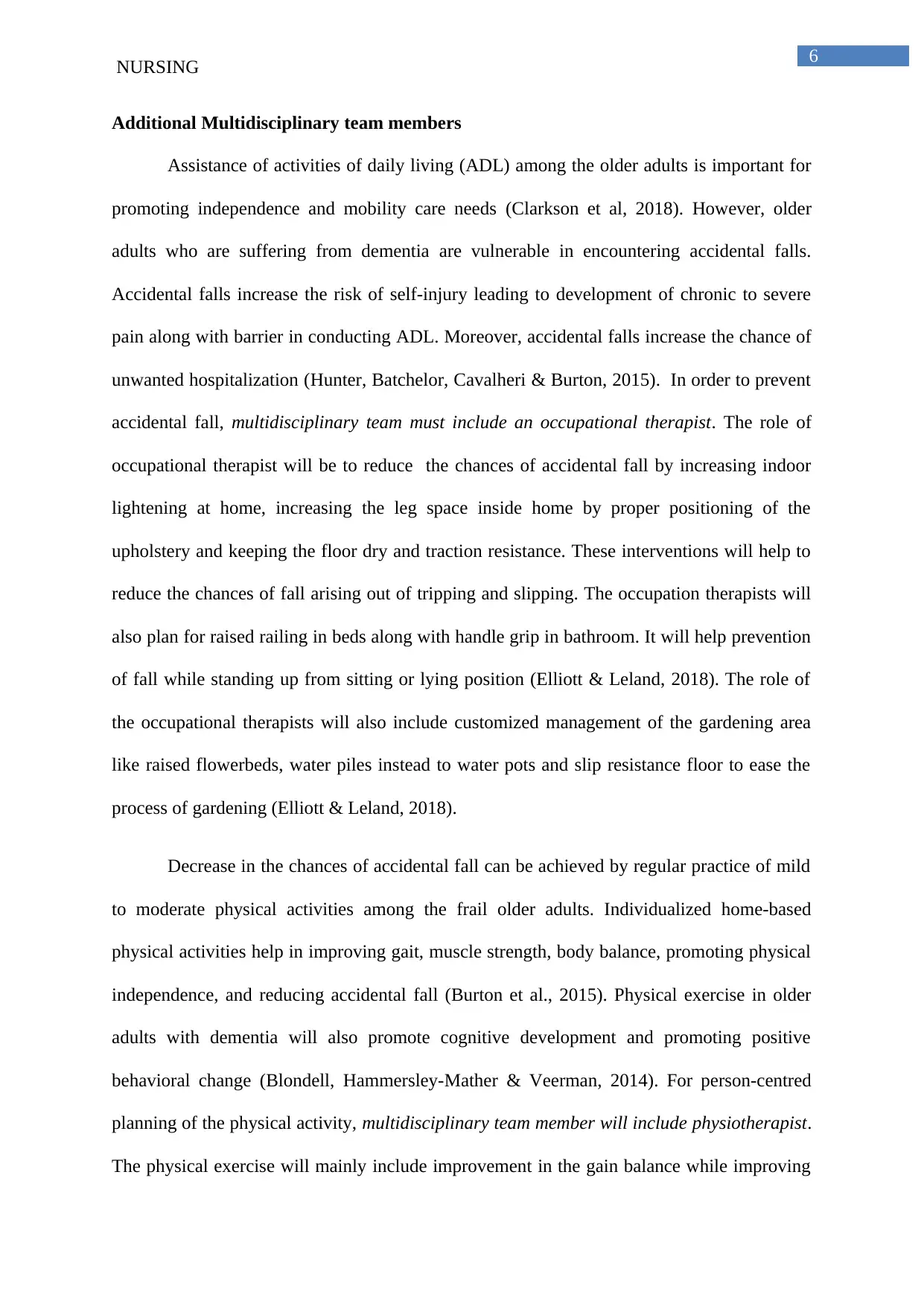
6
NURSING
Additional Multidisciplinary team members
Assistance of activities of daily living (ADL) among the older adults is important for
promoting independence and mobility care needs (Clarkson et al, 2018). However, older
adults who are suffering from dementia are vulnerable in encountering accidental falls.
Accidental falls increase the risk of self-injury leading to development of chronic to severe
pain along with barrier in conducting ADL. Moreover, accidental falls increase the chance of
unwanted hospitalization (Hunter, Batchelor, Cavalheri & Burton, 2015). In order to prevent
accidental fall, multidisciplinary team must include an occupational therapist. The role of
occupational therapist will be to reduce the chances of accidental fall by increasing indoor
lightening at home, increasing the leg space inside home by proper positioning of the
upholstery and keeping the floor dry and traction resistance. These interventions will help to
reduce the chances of fall arising out of tripping and slipping. The occupation therapists will
also plan for raised railing in beds along with handle grip in bathroom. It will help prevention
of fall while standing up from sitting or lying position (Elliott & Leland, 2018). The role of
the occupational therapists will also include customized management of the gardening area
like raised flowerbeds, water piles instead to water pots and slip resistance floor to ease the
process of gardening (Elliott & Leland, 2018).
Decrease in the chances of accidental fall can be achieved by regular practice of mild
to moderate physical activities among the frail older adults. Individualized home-based
physical activities help in improving gait, muscle strength, body balance, promoting physical
independence, and reducing accidental fall (Burton et al., 2015). Physical exercise in older
adults with dementia will also promote cognitive development and promoting positive
behavioral change (Blondell, Hammersley-Mather & Veerman, 2014). For person-centred
planning of the physical activity, multidisciplinary team member will include physiotherapist.
The physical exercise will mainly include improvement in the gain balance while improving
NURSING
Additional Multidisciplinary team members
Assistance of activities of daily living (ADL) among the older adults is important for
promoting independence and mobility care needs (Clarkson et al, 2018). However, older
adults who are suffering from dementia are vulnerable in encountering accidental falls.
Accidental falls increase the risk of self-injury leading to development of chronic to severe
pain along with barrier in conducting ADL. Moreover, accidental falls increase the chance of
unwanted hospitalization (Hunter, Batchelor, Cavalheri & Burton, 2015). In order to prevent
accidental fall, multidisciplinary team must include an occupational therapist. The role of
occupational therapist will be to reduce the chances of accidental fall by increasing indoor
lightening at home, increasing the leg space inside home by proper positioning of the
upholstery and keeping the floor dry and traction resistance. These interventions will help to
reduce the chances of fall arising out of tripping and slipping. The occupation therapists will
also plan for raised railing in beds along with handle grip in bathroom. It will help prevention
of fall while standing up from sitting or lying position (Elliott & Leland, 2018). The role of
the occupational therapists will also include customized management of the gardening area
like raised flowerbeds, water piles instead to water pots and slip resistance floor to ease the
process of gardening (Elliott & Leland, 2018).
Decrease in the chances of accidental fall can be achieved by regular practice of mild
to moderate physical activities among the frail older adults. Individualized home-based
physical activities help in improving gait, muscle strength, body balance, promoting physical
independence, and reducing accidental fall (Burton et al., 2015). Physical exercise in older
adults with dementia will also promote cognitive development and promoting positive
behavioral change (Blondell, Hammersley-Mather & Veerman, 2014). For person-centred
planning of the physical activity, multidisciplinary team member will include physiotherapist.
The physical exercise will mainly include improvement in the gain balance while improving
Paraphrase This Document
Need a fresh take? Get an instant paraphrase of this document with our AI Paraphraser
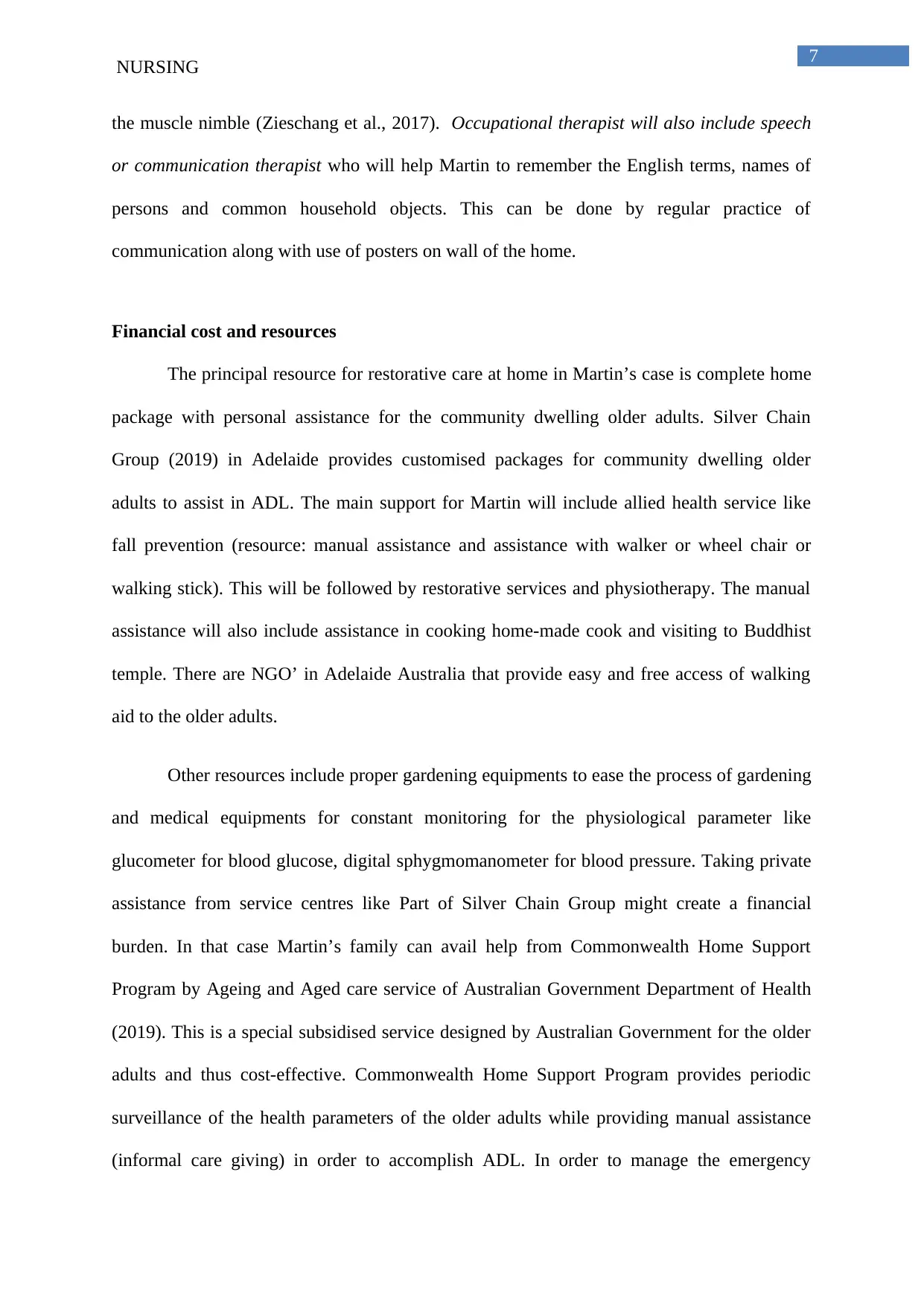
7
NURSING
the muscle nimble (Zieschang et al., 2017). Occupational therapist will also include speech
or communication therapist who will help Martin to remember the English terms, names of
persons and common household objects. This can be done by regular practice of
communication along with use of posters on wall of the home.
Financial cost and resources
The principal resource for restorative care at home in Martin’s case is complete home
package with personal assistance for the community dwelling older adults. Silver Chain
Group (2019) in Adelaide provides customised packages for community dwelling older
adults to assist in ADL. The main support for Martin will include allied health service like
fall prevention (resource: manual assistance and assistance with walker or wheel chair or
walking stick). This will be followed by restorative services and physiotherapy. The manual
assistance will also include assistance in cooking home-made cook and visiting to Buddhist
temple. There are NGO’ in Adelaide Australia that provide easy and free access of walking
aid to the older adults.
Other resources include proper gardening equipments to ease the process of gardening
and medical equipments for constant monitoring for the physiological parameter like
glucometer for blood glucose, digital sphygmomanometer for blood pressure. Taking private
assistance from service centres like Part of Silver Chain Group might create a financial
burden. In that case Martin’s family can avail help from Commonwealth Home Support
Program by Ageing and Aged care service of Australian Government Department of Health
(2019). This is a special subsidised service designed by Australian Government for the older
adults and thus cost-effective. Commonwealth Home Support Program provides periodic
surveillance of the health parameters of the older adults while providing manual assistance
(informal care giving) in order to accomplish ADL. In order to manage the emergency
NURSING
the muscle nimble (Zieschang et al., 2017). Occupational therapist will also include speech
or communication therapist who will help Martin to remember the English terms, names of
persons and common household objects. This can be done by regular practice of
communication along with use of posters on wall of the home.
Financial cost and resources
The principal resource for restorative care at home in Martin’s case is complete home
package with personal assistance for the community dwelling older adults. Silver Chain
Group (2019) in Adelaide provides customised packages for community dwelling older
adults to assist in ADL. The main support for Martin will include allied health service like
fall prevention (resource: manual assistance and assistance with walker or wheel chair or
walking stick). This will be followed by restorative services and physiotherapy. The manual
assistance will also include assistance in cooking home-made cook and visiting to Buddhist
temple. There are NGO’ in Adelaide Australia that provide easy and free access of walking
aid to the older adults.
Other resources include proper gardening equipments to ease the process of gardening
and medical equipments for constant monitoring for the physiological parameter like
glucometer for blood glucose, digital sphygmomanometer for blood pressure. Taking private
assistance from service centres like Part of Silver Chain Group might create a financial
burden. In that case Martin’s family can avail help from Commonwealth Home Support
Program by Ageing and Aged care service of Australian Government Department of Health
(2019). This is a special subsidised service designed by Australian Government for the older
adults and thus cost-effective. Commonwealth Home Support Program provides periodic
surveillance of the health parameters of the older adults while providing manual assistance
(informal care giving) in order to accomplish ADL. In order to manage the emergency
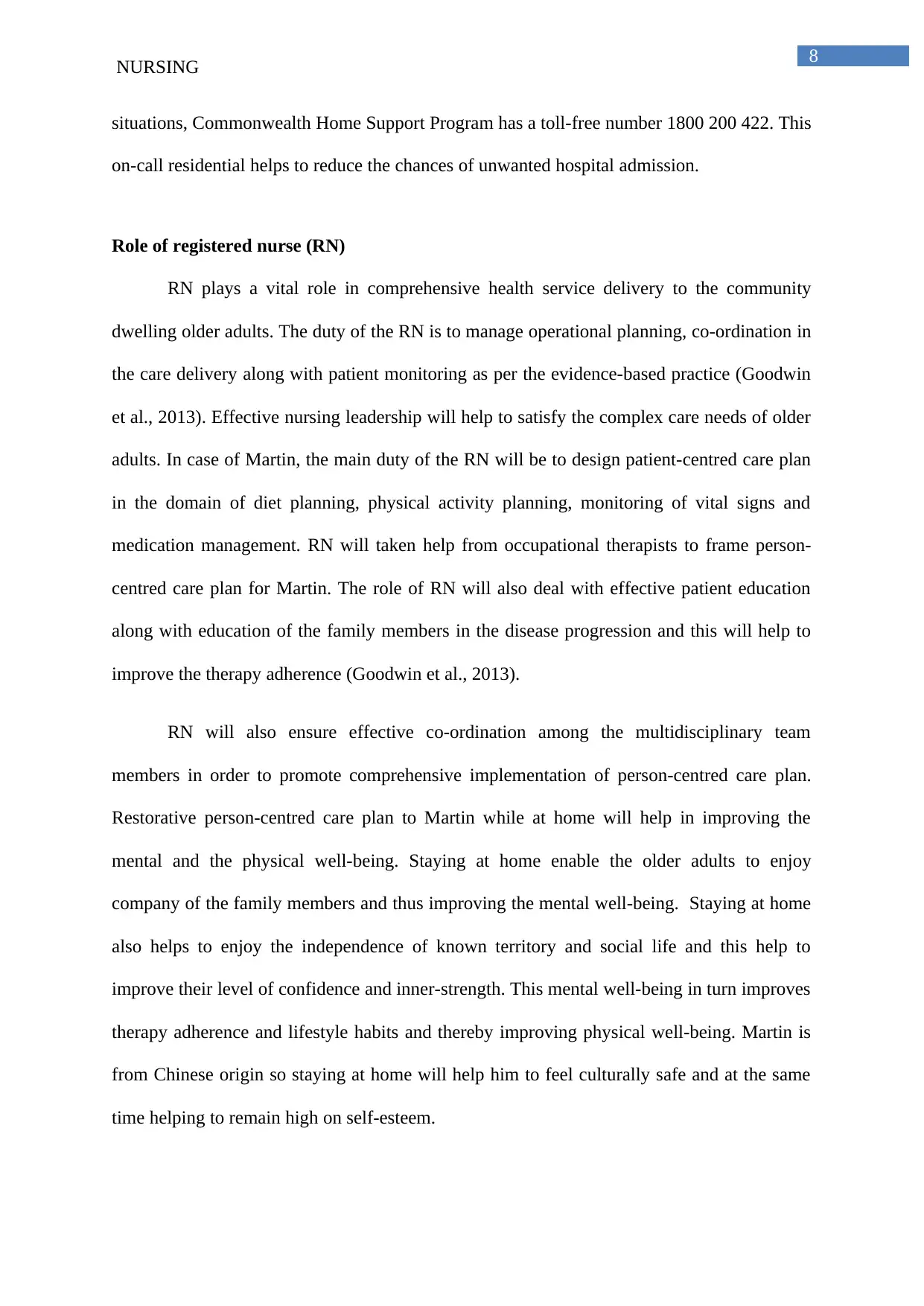
8
NURSING
situations, Commonwealth Home Support Program has a toll-free number 1800 200 422. This
on-call residential helps to reduce the chances of unwanted hospital admission.
Role of registered nurse (RN)
RN plays a vital role in comprehensive health service delivery to the community
dwelling older adults. The duty of the RN is to manage operational planning, co-ordination in
the care delivery along with patient monitoring as per the evidence-based practice (Goodwin
et al., 2013). Effective nursing leadership will help to satisfy the complex care needs of older
adults. In case of Martin, the main duty of the RN will be to design patient-centred care plan
in the domain of diet planning, physical activity planning, monitoring of vital signs and
medication management. RN will taken help from occupational therapists to frame person-
centred care plan for Martin. The role of RN will also deal with effective patient education
along with education of the family members in the disease progression and this will help to
improve the therapy adherence (Goodwin et al., 2013).
RN will also ensure effective co-ordination among the multidisciplinary team
members in order to promote comprehensive implementation of person-centred care plan.
Restorative person-centred care plan to Martin while at home will help in improving the
mental and the physical well-being. Staying at home enable the older adults to enjoy
company of the family members and thus improving the mental well-being. Staying at home
also helps to enjoy the independence of known territory and social life and this help to
improve their level of confidence and inner-strength. This mental well-being in turn improves
therapy adherence and lifestyle habits and thereby improving physical well-being. Martin is
from Chinese origin so staying at home will help him to feel culturally safe and at the same
time helping to remain high on self-esteem.
NURSING
situations, Commonwealth Home Support Program has a toll-free number 1800 200 422. This
on-call residential helps to reduce the chances of unwanted hospital admission.
Role of registered nurse (RN)
RN plays a vital role in comprehensive health service delivery to the community
dwelling older adults. The duty of the RN is to manage operational planning, co-ordination in
the care delivery along with patient monitoring as per the evidence-based practice (Goodwin
et al., 2013). Effective nursing leadership will help to satisfy the complex care needs of older
adults. In case of Martin, the main duty of the RN will be to design patient-centred care plan
in the domain of diet planning, physical activity planning, monitoring of vital signs and
medication management. RN will taken help from occupational therapists to frame person-
centred care plan for Martin. The role of RN will also deal with effective patient education
along with education of the family members in the disease progression and this will help to
improve the therapy adherence (Goodwin et al., 2013).
RN will also ensure effective co-ordination among the multidisciplinary team
members in order to promote comprehensive implementation of person-centred care plan.
Restorative person-centred care plan to Martin while at home will help in improving the
mental and the physical well-being. Staying at home enable the older adults to enjoy
company of the family members and thus improving the mental well-being. Staying at home
also helps to enjoy the independence of known territory and social life and this help to
improve their level of confidence and inner-strength. This mental well-being in turn improves
therapy adherence and lifestyle habits and thereby improving physical well-being. Martin is
from Chinese origin so staying at home will help him to feel culturally safe and at the same
time helping to remain high on self-esteem.
⊘ This is a preview!⊘
Do you want full access?
Subscribe today to unlock all pages.

Trusted by 1+ million students worldwide
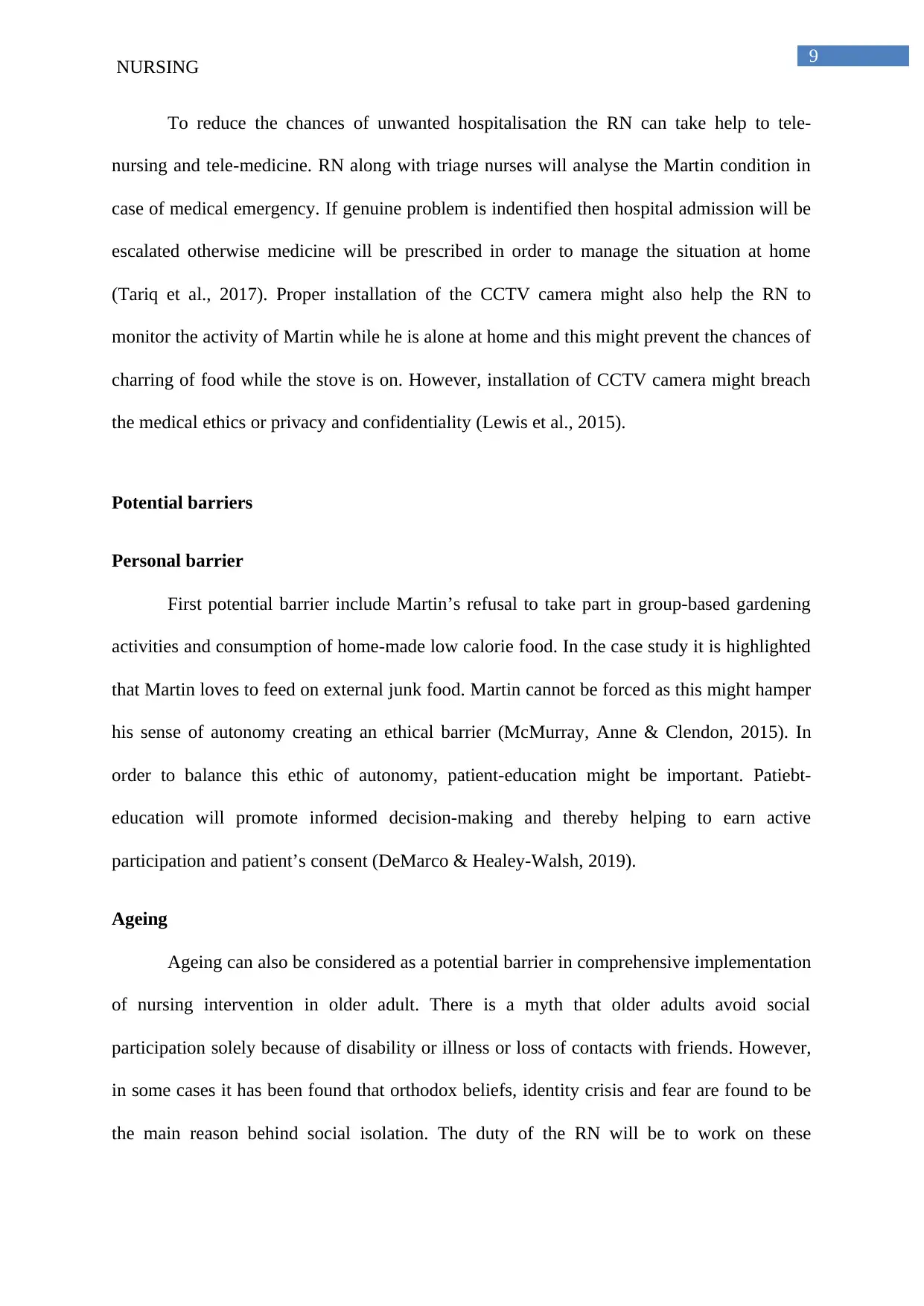
9
NURSING
To reduce the chances of unwanted hospitalisation the RN can take help to tele-
nursing and tele-medicine. RN along with triage nurses will analyse the Martin condition in
case of medical emergency. If genuine problem is indentified then hospital admission will be
escalated otherwise medicine will be prescribed in order to manage the situation at home
(Tariq et al., 2017). Proper installation of the CCTV camera might also help the RN to
monitor the activity of Martin while he is alone at home and this might prevent the chances of
charring of food while the stove is on. However, installation of CCTV camera might breach
the medical ethics or privacy and confidentiality (Lewis et al., 2015).
Potential barriers
Personal barrier
First potential barrier include Martin’s refusal to take part in group-based gardening
activities and consumption of home-made low calorie food. In the case study it is highlighted
that Martin loves to feed on external junk food. Martin cannot be forced as this might hamper
his sense of autonomy creating an ethical barrier (McMurray, Anne & Clendon, 2015). In
order to balance this ethic of autonomy, patient-education might be important. Patiebt-
education will promote informed decision-making and thereby helping to earn active
participation and patient’s consent (DeMarco & Healey-Walsh, 2019).
Ageing
Ageing can also be considered as a potential barrier in comprehensive implementation
of nursing intervention in older adult. There is a myth that older adults avoid social
participation solely because of disability or illness or loss of contacts with friends. However,
in some cases it has been found that orthodox beliefs, identity crisis and fear are found to be
the main reason behind social isolation. The duty of the RN will be to work on these
NURSING
To reduce the chances of unwanted hospitalisation the RN can take help to tele-
nursing and tele-medicine. RN along with triage nurses will analyse the Martin condition in
case of medical emergency. If genuine problem is indentified then hospital admission will be
escalated otherwise medicine will be prescribed in order to manage the situation at home
(Tariq et al., 2017). Proper installation of the CCTV camera might also help the RN to
monitor the activity of Martin while he is alone at home and this might prevent the chances of
charring of food while the stove is on. However, installation of CCTV camera might breach
the medical ethics or privacy and confidentiality (Lewis et al., 2015).
Potential barriers
Personal barrier
First potential barrier include Martin’s refusal to take part in group-based gardening
activities and consumption of home-made low calorie food. In the case study it is highlighted
that Martin loves to feed on external junk food. Martin cannot be forced as this might hamper
his sense of autonomy creating an ethical barrier (McMurray, Anne & Clendon, 2015). In
order to balance this ethic of autonomy, patient-education might be important. Patiebt-
education will promote informed decision-making and thereby helping to earn active
participation and patient’s consent (DeMarco & Healey-Walsh, 2019).
Ageing
Ageing can also be considered as a potential barrier in comprehensive implementation
of nursing intervention in older adult. There is a myth that older adults avoid social
participation solely because of disability or illness or loss of contacts with friends. However,
in some cases it has been found that orthodox beliefs, identity crisis and fear are found to be
the main reason behind social isolation. The duty of the RN will be to work on these
Paraphrase This Document
Need a fresh take? Get an instant paraphrase of this document with our AI Paraphraser
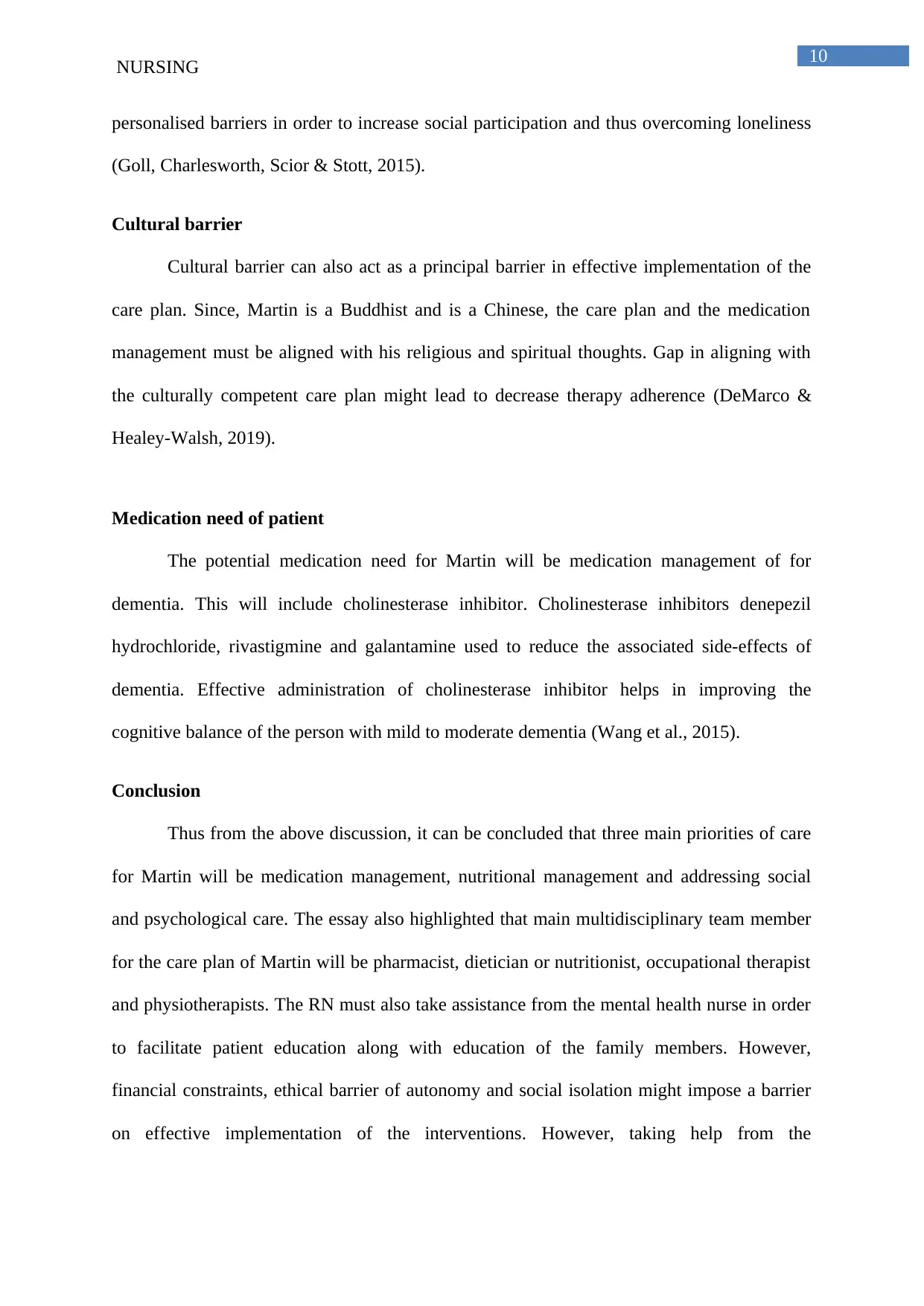
10
NURSING
personalised barriers in order to increase social participation and thus overcoming loneliness
(Goll, Charlesworth, Scior & Stott, 2015).
Cultural barrier
Cultural barrier can also act as a principal barrier in effective implementation of the
care plan. Since, Martin is a Buddhist and is a Chinese, the care plan and the medication
management must be aligned with his religious and spiritual thoughts. Gap in aligning with
the culturally competent care plan might lead to decrease therapy adherence (DeMarco &
Healey-Walsh, 2019).
Medication need of patient
The potential medication need for Martin will be medication management of for
dementia. This will include cholinesterase inhibitor. Cholinesterase inhibitors denepezil
hydrochloride, rivastigmine and galantamine used to reduce the associated side-effects of
dementia. Effective administration of cholinesterase inhibitor helps in improving the
cognitive balance of the person with mild to moderate dementia (Wang et al., 2015).
Conclusion
Thus from the above discussion, it can be concluded that three main priorities of care
for Martin will be medication management, nutritional management and addressing social
and psychological care. The essay also highlighted that main multidisciplinary team member
for the care plan of Martin will be pharmacist, dietician or nutritionist, occupational therapist
and physiotherapists. The RN must also take assistance from the mental health nurse in order
to facilitate patient education along with education of the family members. However,
financial constraints, ethical barrier of autonomy and social isolation might impose a barrier
on effective implementation of the interventions. However, taking help from the
NURSING
personalised barriers in order to increase social participation and thus overcoming loneliness
(Goll, Charlesworth, Scior & Stott, 2015).
Cultural barrier
Cultural barrier can also act as a principal barrier in effective implementation of the
care plan. Since, Martin is a Buddhist and is a Chinese, the care plan and the medication
management must be aligned with his religious and spiritual thoughts. Gap in aligning with
the culturally competent care plan might lead to decrease therapy adherence (DeMarco &
Healey-Walsh, 2019).
Medication need of patient
The potential medication need for Martin will be medication management of for
dementia. This will include cholinesterase inhibitor. Cholinesterase inhibitors denepezil
hydrochloride, rivastigmine and galantamine used to reduce the associated side-effects of
dementia. Effective administration of cholinesterase inhibitor helps in improving the
cognitive balance of the person with mild to moderate dementia (Wang et al., 2015).
Conclusion
Thus from the above discussion, it can be concluded that three main priorities of care
for Martin will be medication management, nutritional management and addressing social
and psychological care. The essay also highlighted that main multidisciplinary team member
for the care plan of Martin will be pharmacist, dietician or nutritionist, occupational therapist
and physiotherapists. The RN must also take assistance from the mental health nurse in order
to facilitate patient education along with education of the family members. However,
financial constraints, ethical barrier of autonomy and social isolation might impose a barrier
on effective implementation of the interventions. However, taking help from the

11
NURSING
Commonwealth Home Support Program in Australia might help to resolve the requirement of
home-based intervention through government impose subsidy.
NURSING
Commonwealth Home Support Program in Australia might help to resolve the requirement of
home-based intervention through government impose subsidy.
⊘ This is a preview!⊘
Do you want full access?
Subscribe today to unlock all pages.

Trusted by 1+ million students worldwide
1 out of 17
Related Documents
Your All-in-One AI-Powered Toolkit for Academic Success.
+13062052269
info@desklib.com
Available 24*7 on WhatsApp / Email
![[object Object]](/_next/static/media/star-bottom.7253800d.svg)
Unlock your academic potential
Copyright © 2020–2026 A2Z Services. All Rights Reserved. Developed and managed by ZUCOL.





